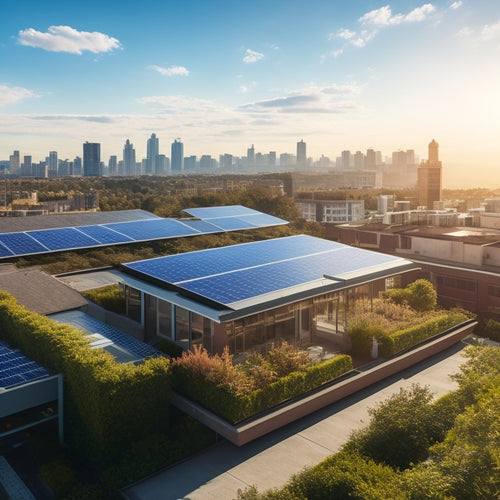
Benefits of a Solar Array System for Homes
Share
By installing a solar array system in your home, you'll not only reduce your carbon footprint and contribute to climate change mitigation, but you'll also enjoy significant benefits. You'll save money on your electricity bills, potentially increase your property value, and gain energy independence from the grid. With minimal maintenance costs and government incentives available, the investment becomes even more attractive. As you investigate the world of solar energy, you'll uncover more advantages that can enhance your lifestyle and reduce your environmental impact.
Key Takeaways
- Solar array systems significantly reduce carbon footprint, minimizing reliance on fossil fuels and contributing to climate change mitigation.
- Installation of solar array systems leads to considerable decreases in electricity bills, enhancing energy independence and savings.
- Solar-powered homes gain a competitive edge in the real estate market, increasing property value by up to $15,000.
- Solar array systems require minimal upkeep due to reliability and durability, with easy cleaning and infrequent inspections.
- Federal tax credits and state rebate programs provide financial incentives for solar adoption, covering up to 30% of system costs.
Renewable Energy for Your Home
Embracing renewable energy for your home can be a game-changing factor, especially with the rising concerns about climate change and depleting natural resources.
By investing in a solar array system, you're not only reducing your reliance on fossil fuels but also taking advantage of solar technology advancements that make it more efficient and cost-effective.
As you consider renewable energy for your home, it's crucial to assess your current energy consumption and identify areas for improvement.
Conducting an energy audit can help you pinpoint opportunities to enhance home energy efficiency, such as upgrading to energy-efficient appliances, sealing air leaks, and adding insulation.
By combining these efforts with a solar array system, you'll be able to maximize your energy savings and reduce your energy bills.
With the right approach, you can create a more sustainable and energy-efficient home that not only benefits the environment but also your wallet.
Reduced Carbon Footprint Impact
With a solar array system installed, you'll greatly reduce your carbon footprint by utilizing clean energy from the sun. This significant reduction in greenhouse gas emissions aligns with sustainable lifestyle choices and environmental conservation practices.
By tapping into solar power, you'll minimize your reliance on fossil fuels, decreasing the amount of carbon dioxide released into the atmosphere. As a result, you'll contribute less to climate change and air pollution.
The environmental benefits of a solar array system are substantial. You'll reduce your carbon footprint by an average of 3-4 tons per year, equivalent to planting over 100 trees.
Additionally, solar energy generates electricity without emitting harmful pollutants like nitrogen oxides, sulfur dioxide, and particulate matter. By choosing a solar array system, you'll make a significant impact on reducing your home's environmental impact, supporting a cleaner and healthier planet for future generations.
Lower Your Electricity Bills
Your electricity bills will considerably decrease once you've installed a solar array system.
This is because solar panels convert sunlight into electrical energy, reducing your reliance on the grid. With high solar panel efficiency, you'll generate more power from the same amount of sunlight, resulting in lower electricity bills.
Additionally, smart home integration allows you to monitor and control your energy usage in real-time, optimizing your energy consumption and further reducing costs.
Increased Property Value Potential
As you enjoy the cost savings from your reduced electricity bills, you'll also reap the benefits of increased property value potential.
A solar array system can greatly enhance your property's value, making it more attractive to potential buyers if you decide to sell in the future. This is because solar technology advancements have made renewable energy a highly sought-after feature in the property market trends.
Here are some key benefits to evaluate:
-
Increased resale value: A study by the National Renewable Energy Laboratory found that solar panels can increase a home's value by up to $15,000.
-
Competitive advantage: A solar-powered home stands out in a crowded market, giving you a competitive edge over other sellers.
-
Appeal to environmentally conscious buyers: Many homebuyers are willing to pay a premium for eco-friendly features, making your solar-powered home more attractive to them.
- Long-term investment: Solar panels are a long-term investment, providing a return on investment through increased property value and lower electricity bills.
Energy Independence From Grid
Nearly 90% of Americans believe the U.S. should prioritize solar energy, and one major reason is the allure of energy independence from the grid.
With a solar array system on your home, you'll be generating your own clean energy, reducing your reliance on the grid. This means you'll have more control over your energy costs and usage.
You'll also be contributing to grid stability, as the excess energy you produce can be fed back into the grid and sold to your utility company.
Low Maintenance Cost Savings
With a solar array system, you're investing in a technology designed to last, and that means minimal upkeep costs over its extensive lifespan. This is thanks to the system's reliability and long-term durability, which guarantee that your solar panels will continue to generate power efficiently for years to come.
Here are some key benefits of low maintenance cost savings:
-
Few moving parts: Solar panels have no moving parts, which means they're less prone to mechanical failure and require less maintenance.
-
Durable materials: Solar panels are made with durable materials that can withstand harsh weather conditions, reducing the need for repairs or replacement.
-
Easy cleaning: Solar panels are easy to clean, and regular cleaning can be done with just water and a soft cloth.
- Infrequent inspections: Solar arrays require infrequent inspections, typically only once a year, to guarantee peak performance.
Government Incentives Available
You can greatly reduce the cost of your solar array system by taking advantage of government incentives.
The federal government offers tax credits that can cover up to 30% of your system's cost, and you can claim these credits on your tax return.
Additionally, many states offer rebate programs that provide further financial incentives for adopting solar energy.
Federal Tax Credits
Most solar array system owners can claim a considerable portion of their investment back through federal tax credits. As a homeowner, you can take advantage of this incentive to offset the cost of your solar investment.
To be eligible, you must meet specific tax credit eligibility criteria, including owning the solar array system and using it to generate electricity for your home.
Here are some key benefits of federal tax credits for solar array systems:
-
26% of total cost: You can claim 26% of the total cost of your solar array system as a tax credit, which can considerably reduce your tax liability.
-
No cap on credit amount: There's no cap on the amount of credit you can claim, making it a beneficial incentive for larger solar investments.
-
Carryover for up to 5 years: If you can't claim the full credit in one year, you can carry it over for up to 5 years.
- Applicable to residential and commercial: Both residential and commercial solar array systems are eligible for federal tax credits, making it a beneficial incentive for businesses and homeowners alike.
State Rebate Programs
State governments also offer rebates to encourage the adoption of solar array systems. As a homeowner, you may be eligible for state rebate programs that can help offset the cost of installing a solar array system. These rebates vary by state, so it's crucial to research the state eligibility requirements for your area.
Typically, you'll need to meet certain criteria, such as installing a system that meets specific energy efficiency standards or using a certified installer.
To take advantage of these rebates, you'll need to maneuver through the rebate application process. This usually involves submitting an application, providing documentation about your system, and waiting for approval.
Some states offer upfront rebates, while others provide rebates as a credit on your utility bill. Be sure to review the program details carefully to understand the application process, deadlines, and any additional requirements.
Frequently Asked Questions
How Long Does a Solar Array System Typically Last?
As you gaze up at your newly installed solar array, you wonder how long it'll shine bright; typically, solar panels last around 25-30 years, with minimal maintenance requirements, ensuring a quarter-century of capturing the sun's energy.
Can I Install a Solar Array System Myself?
You can install a solar array system yourself, but be cautious: improper installation can void warranties and compromise efficiency. Research installation tips and DIY considerations carefully, ensuring you meet local building codes and electrical standards.
Are Solar Panels Resistant to Hail and Extreme Weather?
You're probably thinking solar panels are fragile, but trust us, they're built to withstand apocalyptic hail storms! In reality, most panels can resist hail damage up to 1 inch in diameter and extreme weather conditions, ensuring your power supply remains uninterrupted.
Can I Add More Panels to My Existing Solar Array?
You can add more panels to your existing solar array, but consider cost considerations and installation limitations, such as roof space, electrical capacity, and local permits, to guarantee a seamless and efficient expansion.
Will a Solar Array System Affect My Roof's Warranty?
As you commence a solar-powered expedition, you're wise to wonder if installing an array will void your roof's warranty. Fortunately, it won't, but be sure to choose an installer who follows manufacturer guidelines to avoid any roof warranty implications.
Related Posts
-

Why Choose Solar Car Battery Charging Systems?
You're switching to a cleaner, more sustainable transportation option by choosing solar car battery charging systems,...
-

Master Advanced Solar Panel Design Online for Free
You can master advanced solar panel design online for free by leveraging specialized courses and training platforms, ...
-

What Is the Cost to Put in Solar Panels
You're likely considering solar panels for your home, and the most significant factor in your decision is the upfront...


